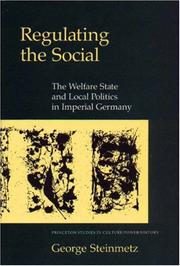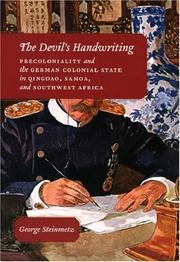| Listing 1 - 10 of 39 | << page >> |
Sort by
|

ISBN: 0801485339 9780801485336 0801436737 9780801436734 1501717782 Year: 1999 Volume: *7 Publisher: Ithaca, N.Y.: Cornell university press,
Abstract | Keywords | Export | Availability | Bookmark
 Loading...
Loading...Choose an application
- Reference Manager
- EndNote
- RefWorks (Direct export to RefWorks)
What impact does culture have on state-formation and public policy? How do states affect national and local cultures? How is the ongoing cultural turn in theory reshaping our understanding of the Western and modernizing states, long viewed as the radiant core of a universal, context-free rationality? This eagerly awaited volume brings together pioneering scholars who reexamine the sociology of the state and historical processes of state-formation in light of developments in cultural analysis.The volume first examines some of the unsatisfying ways in which cultural processes have been discussed in social science literature on the state. It demonstrates new and sophisticated approaches to understanding both the role culture plays in the formation of states and the state's influence on broad cultural developments. The book includes theoretical essays and empirical studies; the latter essays are concerned with early modern European nations, non-European countries undergoing political modernization, and twentieth-century Western nation-states. A wide range of perspectives are presented in order to delineate this emergent area of research. Together the essays constitute an agenda-setting work for the social sciences.
Caractères culturels --- Caractères ethniques --- Conscience nationale --- Consciousness [National ] --- Cultural diversity policy --- Cultural pluralism policy --- Culture --- Cultuur --- Diversité culturelle --- Etat [L' ] --- Ethnic identity --- Ethnicity --- Ethnicité --- Ethnisch bewustzijn --- Geschiedenis [Moderne ] --- Groepsbewustzijn [Etnisch ] --- Group identity [Ethnic ] --- Groupes ethniques -- Identité --- Histoire moderne --- History [Modern ] --- Identity [National ] --- Identité culturelle --- Identité ethnique --- Identité raciale --- Identités ethniques --- Modern history --- Moderne history --- Multiculturalism --- Multiculturalism--Government policy --- Multiculturalisme --- Multiculturele samenleving --- Nationaal bewustzijn --- Nationaal gevoel --- National consciousness --- National identity --- Nationalism --- Nationalisme --- Samenleving [Multiculturele ] --- Sentiment national --- Staat [De ] --- State [The ] --- Tribalisme --- World history [Modern ] --- History, Modern --- State, The --- #SBIB:324H20 --- #SBIB:321H30 --- #SBIB:35H006 --- #SBIB:002.IO --- Cultural pluralism --- Ethnic diversity policy --- Social policy --- Anti-racism --- Cultural fusion --- Group identity --- Cultural sociology --- Sociology of culture --- Civilization --- Administration --- Commonwealth, The --- Sovereignty --- Political science --- World history, Modern --- World history --- Consciousness, National --- Identity, National --- International relations --- Patriotism --- Autonomy and independence movements --- Internationalism --- Political messianism --- Politologie: theorieën (democratie, comparatieve studieën….) --- Hedendaagse politieke en sociale theorieën (vanaf de 19de eeuw): algemeen (incl. utilitarisme, burgerschap) --- Bestuurswetenschappen: theorieën --- Government policy --- Social aspects --- Culture. --- Ethnicity. --- History, Modern. --- Multiculturalism. --- Nationalism. --- State, The. --- Multiculturalismo --- Multikulturalismus --- Pluralismo cultural --- Popular culture --- Etat --- Histoire moderne et contemporaine
Book
ISBN: 9780822352792 9780822352587 0822352583 0822352796 0822395401 1299677568 Year: 2013 Publisher: Durham, N.C.: Duke university press,
Abstract | Keywords | Export | Availability | Bookmark
 Loading...
Loading...Choose an application
- Reference Manager
- EndNote
- RefWorks (Direct export to RefWorks)
The revelation that the U.S. Department of Defense had hired anthropologists for its Human Terrain System project--assisting its operations in Afghanistan and Iraq--caused an uproar that has obscured the participation of sociologists in similar Pentagon-funded projects. As the contributors to Sociology and Empire show, such affiliations are not new. Sociologists have been active as advisers, theorists, and analysts of Western imperialism for more than a century. The collection has a threefold agenda: to trace an intellectual history of sociology as it pertains to empire; to offer empirical studies based around colonies and empires, both past and present; and to provide a theoretical basis for future sociological analyses that may take empire more fully into account. In the 1940s, the British Colonial Office began employing sociologists in its African colonies. In Nazi Germany, sociologists played a leading role in organizing the occupation of Eastern Europe. In the United States, sociology contributed to modernization theory, which served as an informal blueprint for the postwar American empire. This comprehensive anthology critiques sociology's disciplinary engagement with colonialism in varied settings while also highlighting the lasting contributions that sociologists have made to the theory and history of imperism.
Imperialism. --- Sociology. --- Impérialisme --- Sociologie --- Impérialisme --- Imperialism --- Sociology --- Sociologie. --- Impérialisme. --- Political sociology --- Sociological theories --- International relations. Foreign policy --- Social theory --- Social sciences --- Colonialism --- Empires --- Expansion (United States politics) --- Neocolonialism --- Political science --- Anti-imperialist movements --- Caesarism --- Chauvinism and jingoism --- Militarism --- Impérialisme.

ISBN: 1282751735 9786612751738 1400820960 1400813506 0691032408 9781400813506 9781400820962 9780691032405 9781282751736 6612751738 1400818222 Year: 1993 Publisher: Princeton, N.J. Princeton University Press
Abstract | Keywords | Export | Availability | Bookmark
 Loading...
Loading...Choose an application
- Reference Manager
- EndNote
- RefWorks (Direct export to RefWorks)
Why does the welfare state develop so unevenly across countries, regions, and localities? What accounts for the exclusions and disciplinary features of social programs? How are elite and popular conceptions of social reality related to welfare policies? George Steinmetz approaches these and other issues by exploring the complex origins and development of local and national social policies in nineteenth-century Germany. Generally regarded as the birthplace of the modern welfare state, Germany experimented with a wide variety of social programs before 1914, including the national social insurance legislation of the 1880's, the "Elberfeld" system of poor relief, protocorporatist policies, and modern forms of social work. Imperial Germany offers a particularly useful context in which to compare different programs at various levels of government. Looking at changes in welfare policy over the course of the nineteenth century, differences between state and municipal interventions, and intercity variations in policy, Steinmetz develops an account that focuses on the specific constraints on local and national policymakers and the different ways of imagining the "social question." Whereas certain aspects of the pre-1914 welfare state reinforced social divisions and even foreshadowed aspects of the Nazi regime, other dimensions actually helped to relieve sickness, poverty, and unemployment. Steinmetz explores the conditions that led to both the positive and the objectionable features of social policy. The explanation draws on statist, Marxist, and social democratic perspectives and on theories of gender and culture.
Germany -- Politics and government -- 1871-1918. --- Germany -- Social conditions -- 1871-1918. --- Germany -- Social policy. --- Public welfare -- Germany -- History -- 19th century. --- Public welfare --- Social Conditions --- Sociology & Social History --- Social Sciences --- History --- Germany --- Social conditions --- Social policy. --- Politics and government --- Law --- General and Others --- Aide sociale --- Histoire --- Allemagne --- Social policy --- Politique et gouvernement --- Conditions sociales --- Politique sociale --- Benevolent institutions --- Poor relief --- Public assistance --- Public charities --- Public relief --- Public welfare reform --- Relief (Aid) --- Social welfare --- Welfare (Public assistance) --- Welfare reform --- Government policy --- Weimar Republic --- Germanii︠a︡ --- Германия --- BRD --- FRN --- Jirmānīya --- جرمانيا --- Nimechchyna --- Gjermani --- Federalʹna Respublika Nimechchyny --- Veĭmarskai︠a︡ Respublika --- Ashkenaz --- Germanyah --- Bundesrepublik Deutschland --- Federal Republic of Germany --- Deutschland --- Repoblika Federalin'i Alemana --- República Federal de Alemania --- Alemania --- República de Alemania --- Bu̇gd Naĭramdakh German Uls --- Kholboony Bu̇gd Naĭramdakh German Uls --- KhBNGU --- ХБНГУ --- German Uls --- Germania --- Republika Federal Alemmana --- Deutsches Reich --- Grossdeutsches Reich --- Weimarer Republik --- Vācijā --- Human services --- Social service --- Germany (Territory under Allied occupation, 1945-1955) --- Germany (Territory under Allied occupation, 1945-1955 : British Zone) --- Germany (Territory under Allied occupation, 1945-1955 : French Zone) --- Germany (Territory under Allied occupation, 1945-1955 : Russian Zone) --- Germany (Territory under Allied occupation, 1945-1955 : U.S. Zone) --- Germany (East) --- Germany (West) --- Holy Roman Empire --- ドイツ --- Doitsu --- ドイツ連邦共和国 --- Doitsu Renpō Kyōwakoku --- ドイツ レンポウ キョウワコク --- Deguo --- 德国 --- Gėrman --- Герман Улс

ISBN: 0822335069 0822335182 9780822335184 9780822335061 0822386887 Year: 2005 Publisher: Durham, N.C.: Duke university press,
Abstract | Keywords | Export | Availability | Bookmark
 Loading...
Loading...Choose an application
- Reference Manager
- EndNote
- RefWorks (Direct export to RefWorks)
The Politics of Method in the Human Sciences provides a remarkable comparative assessment of the variations of positivism and alternative epistemologies in the contemporary human sciences. Often declared obsolete, positivism is alive and well in a number of the fields; in others, its influence is significantly diminished. The essays in this collection investigate its mutations in form and degree across the social science disciplines. Looking at methodological assumptions field by field, individual essays address anthropology, area studies, economics, history, the philosophy of science, political science and political theory, and sociology. Essayists trace disciplinary developments through the long twentieth century, focusing on the decades since World War II.Contributors explore and contrast some of the major alternatives to positivist epistemologies, including Marxism, psychoanalysis, poststructuralism, narrative theory, and actor-network theory. Almost all the essays are written by well-known practitioners of the fields discussed. Some essayists approach positivism and anti-positivism via close readings of texts influential in their respective disciplines. Some engage in ethnographies of the present-day human sciences; others are more historical in method. All of them critique contemporary social scientific practice. Together, they trace a trajectory of thought and method running from the past through the present and pointing toward possible futures.Contributors. Andrew Abbott, Daniel Breslau, Michael Burawoy, Andrew Collier, Michael Dutton, Geoff Eley, Anthony Elliott, Stephen Engelmann, Sandra Harding, Emily Hauptmann, Webb Keane, Tony Lawson, Sophia Mihic, Philip Mirowski, Timothy Mitchell, William H. Sewell Jr., Margaret R. Somers, George Steinmetz, Elizabeth Wingrove
Positivism. --- Social sciences --- Methodology. --- Positivism --- Methodology --- Social sciences - Methodology

ISBN: 128196655X 0226772446 9786611966553 9780226772448 9780226772417 9780226772431 0226772411 0226772438 Year: 2007 Publisher: Chicago University of Chicago Press
Abstract | Keywords | Export | Availability | Bookmark
 Loading...
Loading...Choose an application
- Reference Manager
- EndNote
- RefWorks (Direct export to RefWorks)
Germany's overseas colonial empire was relatively short lived, lasting from 1884 to 1918. During this period, dramatically different policies were enacted in the colonies: in Southwest Africa, German troops carried out a brutal slaughter of the Herero people; in Samoa, authorities pursued a paternalistic defense of native culture; in Qingdao, China, policy veered between harsh racism and cultural exchange.Why did the same colonizing power act in such differing ways? In The Devil's Handwriting, George Steinmetz tackles this question through a brilliant cross
Imperialism. --- Colonialism --- Empires --- Expansion (United States politics) --- Neocolonialism --- Political science --- Anti-imperialist movements --- Caesarism --- Chauvinism and jingoism --- Militarism --- Germany --- Qingdao (China) --- China --- Samoa --- Namibia --- Independent State of Samoa --- Malo Saʻoloto Tutoʻatasi o Samoa --- Government of Samoa --- Malo o Samoa --- Western Samoa --- Cina --- Kinë --- Cathay --- Chinese National Government --- Chung-kuo kuo min cheng fu --- Republic of China (1912-1949) --- Kuo min cheng fu (China : 1912-1949) --- Chung-hua min kuo (1912-1949) --- Kina (China) --- National Government (1912-1949) --- China (Republic : 1912-1949) --- People's Republic of China --- Chinese People's Republic --- Chung-hua jen min kung ho kuo --- Central People's Government of Communist China --- Chung yang jen min cheng fu --- Chung-hua chung yang jen min kung ho kuo --- Central Government of the People's Republic of China --- Zhonghua Renmin Gongheguo --- Zhong hua ren min gong he guo --- Kitaĭskai︠a︡ Narodnai︠a︡ Respublika --- Činská lidová republika --- RRT --- Republik Rakjat Tiongkok --- KNR --- Kytaĭsʹka Narodna Respublika --- Jumhūriyat al-Ṣīn al-Shaʻbīyah --- RRC --- Kitaĭ --- Kínai Népköztársaság --- Chūka Jinmin Kyōwakoku --- Erets Sin --- Sin --- Sāthāranarat Prachāchon Čhīn --- P.R. China --- PR China --- Chung-kuo --- Zhongguo --- Zhonghuaminguo (1912-1949) --- Zhong guo --- Chine --- République Populaire de Chine --- República Popular China --- Catay --- VR China --- VRChina --- 中國 --- 中国 --- 中华人民共和国 --- Jhongguó --- Bu̇gu̇de Nayiramdaxu Dundadu Arad Ulus --- Bu̇gu̇de Nayiramdaqu Dumdadu Arad Ulus --- Bu̇gd Naĭramdakh Dundad Ard Uls --- Khi︠a︡tad --- Kitad --- Dumdadu Ulus --- Dumdad Uls --- Думдад Улс --- Kitajska --- China (Republic : 1949- ) --- Alemania --- Ashkenaz --- BRD --- Bu̇gd Naĭramdakh German Uls --- Bundesrepublik Deutschland --- Deutsches Reich --- Deutschland --- Doitsu --- Doitsu Renpō Kyōwakoku --- Federal Republic of Germany --- Federalʹna Respublika Nimechchyny --- FRN --- German Uls --- Germania --- Germanii︠a︡ --- Germanyah --- Gjermani --- Grossdeutsches Reich --- Jirmānīya --- KhBNGU --- Kholboony Bu̇gd Naĭramdakh German Uls --- Nimechchyna --- Repoblika Federalin'i Alemana --- República de Alemania --- República Federal de Alemania --- Republika Federal Alemmana --- Vācijā --- Veĭmarskai︠a︡ Respublika --- Weimar Republic --- Weimarer Republik --- ХБНГУ --- Германия --- جرمانيا --- ドイツ --- ドイツ連邦共和国 --- ドイツ レンポウ キョウワコク --- Germany (East) --- Germany (Territory under Allied occupation, 1945-1955) --- Germany (Territory under Allied occupation, 1945-1955 : British Zone) --- Germany (Territory under Allied occupation, 1945-1955 : French Zone) --- Germany (Territory under Allied occupation, 1945-1955 : Russian Zone) --- Germany (Territory under Allied occupation, 1945-1955 : U.S. Zone) --- Germany (West) --- Holy Roman Empire --- Colonies --- History. --- Foreign relations --- Race relations. --- History --- Imperialism --- #SBIB:39A73 --- #SBIB:39A75 --- #SBIB:95G --- #SBIB:96G --- S09/0503 --- Etnografie: Afrika --- Etnografie: Azië --- Geschiedenis van Azië (inclusief Arabische wereld, Nabije Oosten) --- Geschiedenis van Afrika --- China: Foreign relations and world politics--China and Germany --- PRC --- P.R.C. --- BNKhAU --- БНХАУ --- Deguo --- 德国 --- Gėrman --- Герман Улс --- colonialism, colonial, germany, qingdao, samoa, africa, regional, sociology, germanic, academic, scholarly, research, history, historical, textbook, educational, higher ed, college, university, classroom, professor, overseas, 1800s, empire, 1900s, herero, genocide, violence, native, indigenous, culture, cultural, race, racism, exchange, ethnography, discourse, namibia, tahiti, colony.
Book
ISBN: 9780691237428 9780691237435 Year: 2023 Publisher: Princeton, N.J. Princeton University Press
Abstract | Keywords | Export | Availability | Bookmark
 Loading...
Loading...Choose an application
- Reference Manager
- EndNote
- RefWorks (Direct export to RefWorks)
"This book is a history of the field of sociology as it existed from the interwar, wartime, and postwar periods in France and its Empire. This does not refer just to sociologists who did some work in the colonies, or occasionally thought about them in their metropolitan work, but a specific field which was constituted to understand and then govern these colonies. The author argues that the re-founding of French sociology during and after World War II - which spawned the likes of Raymond Aron, Jacques Berque, Georges Balandier, and Pierre Bourdieu - occurred within the context of the re-founding of the French empire. Though there was been much discussion of "decolonizing" sociology in the postwar period, the deep history of sociology's connection to French colonialism and empire has been ignored when, the author argues, it is central. The main driver of the expansion of sociology in this period was colonial developmentalism. Sociologists became favored partners of colonial governments, applying their expertise to an array of "social problems," such as de-tribalization, poverty, labor migration, rapid urbanization and the growth of shantytowns, and the decay of traditional families and religious beliefs, and working on "modernizing" solutions. Many sociologists whose careers began in the overseas colonies formulated concepts and theories that quickly entered metropolitan (and then global) sociology, and their origins were forgotten. Steinmetz examines the ways in colonial sociologists differed from the rest of the discipline -in many ways they represented its most dynamic cutting edge-and how their locations may have affected their intellectual agendas and scholarship. He explores the ways in which these sociologists networked and tracks their major intellectual innovations and influence as a group. He also explores the marginalization faced by both sociologists working in the colonies and those born there, while showing the ways in which they were able to overcome them. The specific challenges of colonial sociology-including some very strongly anticolonial colonial sociologists-shaped sociological theory in ways that are still dominant. The book amounts to a historical sociology of French academia all told-with an emphasis on sociology and other human sciences-as well as a collective biography of many of the major figures, many who are continually read and cited to this day"-- "A new history of French social thought that connects postwar sociology to colonialism and empireIn this provocative and original retelling of the history of French social thought, George Steinmetz places the history and development of modern French sociology in the context of the French empire after World War II. Connecting the rise of all the social sciences with efforts by France and other imperial powers to consolidate control over their crisis-ridden colonies, Steinmetz argues that colonial research represented a crucial core of the renascent academic discipline of sociology, especially between the late 1930s and the 1960s. Sociologists, who became favored partners of colonial governments, were asked to apply their expertise to such "social problems" as detribalization, urbanization, poverty, and labor migration. This colonial orientation permeated all the major subfields of sociological research, Steinmetz contends, and is at the center of the work of four influential scholars: Raymond Aron, Jacques Berque, Georges Balandier, and Pierre Bourdieu.In retelling this history, Steinmetz develops and deploys a new methodological approach that combines attention to broadly contextual factors, dynamics within the intellectual development of the social sciences and sociology in particular, and close readings of sociological texts. He moves gradually toward the postwar sociologists of colonialism and their writings, beginning with the most macroscopic contexts, which included the postwar "reoccupation" of the French empire and the turn to developmentalist policies and the resulting demand for new forms of social scientific expertise. After exploring the colonial engagement of researchers in sociology and neighboring fields between and after 1945, he turns to detailed examinations of the work of Aron, who created a sociology of empires; Berque, the leading historical sociologist of North Africa; Balandier, the founder of French Africanist sociology; and Bourdieu, whose renowned theoretical concepts were forged in war-torn, late-colonial Algeria"--
Sociology --- History --- France --- Colonies. --- Sociological theories --- Colonisation. Decolonisation
Article
Abstract | Keywords | Export | Availability | Bookmark
 Loading...
Loading...Choose an application
- Reference Manager
- EndNote
- RefWorks (Direct export to RefWorks)
Digital
ISBN: 9781400820962 9780691032405 Year: 1993 Publisher: Princeton, N.J. Princeton University Press
Abstract | Keywords | Export | Availability | Bookmark
 Loading...
Loading...Choose an application
- Reference Manager
- EndNote
- RefWorks (Direct export to RefWorks)
Book
ISBN: 1787566056 178756603X 1787566048 1787566064 9781787566033 9781787566040 9781787566057 Year: 2018 Publisher: Bingley, UK
Abstract | Keywords | Export | Availability | Bookmark
 Loading...
Loading...Choose an application
- Reference Manager
- EndNote
- RefWorks (Direct export to RefWorks)
Social science, history, and philosophy have often been neglect in thinking through their fundamentally intertwined relationship. The result is often an inattention to philosophy where social science and history is concerned, or a neglect of historicity and social analysis where philosophy is concerned. Meanwhile, the place of values in research is often uneasily passed over in silence. The inattention to, and loss of, the intersection between these different disciplines and their subject matters, leaves our investigations all the more impoverished as a result. In resolving these problems, it is not enough to strive for cooperation or integration, but to rethink of the nature of the disciplines themselves; their interests, purposes, and presuppositions. In this volume, contributors explore different facets of these relationships, and move beyond the problematics erected by positivism often cast in terms of value-free or value-neutral science, that is, a science obsessed with empirical data, schematic classifications, and the pursuit of law-like forms. While positivism has been subject to critique, the influence and legacy of positivism remains. It remains in the way in which we often think about science; the line drawn between the sciences and the humanities; the norms researchers should follow; what a successful explanation looks like; and the ethical, normative, and political implications of scientific research.Aimed at students and researchers of philosophy, history and the social sciences, this book is driven by a desire to revindicate questions concerning ontology and social ontology, to rethink the nature of explanation, and to resituate normativity and values within scientific, social scientific, and historical pursuits.
Philosophy and social sciences. --- Social sciences and philosophy --- Social sciences --- Social sciences and history. --- Ontology. --- Social Science --- Social theory. --- Sociology / Social Theory. --- Being --- Philosophy --- Metaphysics --- Necessity (Philosophy) --- Substance (Philosophy) --- History and social sciences --- History
Book
ISBN: 2020973693 9782020973694 Year: 2008 Publisher: Paris: Seuil,
Abstract | Keywords | Export | Availability | Bookmark
 Loading...
Loading...Choose an application
- Reference Manager
- EndNote
- RefWorks (Direct export to RefWorks)
| Listing 1 - 10 of 39 | << page >> |
Sort by
|

 Search
Search Feedback
Feedback About UniCat
About UniCat  Help
Help News
News